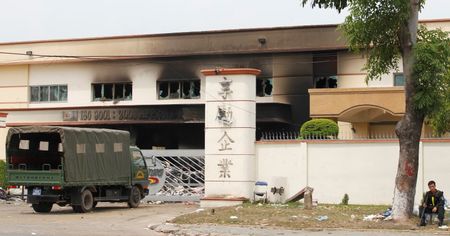Vietnam envoy to visit China to seek thaw in testy ties

By Martin Petty
HANOI (Reuters) – Vietnam will send a special envoy to China this week to try to rebuild battered diplomatic ties with its communist neighbour after they sank to their lowest in three decades, amid a flare-up over sovereignty in the South China Sea.
Vietnam’s Foreign Ministry on Monday said Le Hong Anh, a member of the Communist Party’s powerful politburo, had been invited to meet Chinese leaders to try to ease tension and stabilise ties with Beijing, with which it shares $50 billion of annual trade.
The visit, starting on Tuesday, is the first sign of a concerted effort to heal rifts between two sides locked in a war of words since May 2, when China deployed a $1-billion oil rig in waters Vietnam claims as its exclusive economic zone. China moved the rig on July 16, saying its mission was complete.
The last high-profile meeting between the two sides on June 18 ended in stalemate, with China’s top diplomat, Yang Jiechi, telling Vietnam to “stop hyping up” the row and Vietnam re-asserting its maritime claim.
The Vietnamese envoy would discuss “measures to ease the situation, prevent the recurrence of recent tension, and enhance the relationship…towards a sound development and long-term stability,” spokesman Le Hai Binh said in a statement on the ministry’s website.
The deployment of the Haiyang Shiyou 981 rig caused an outpouring of anger in Vietnam, where bitterness is entrenched over what its people see as a history of Chinese bullying.
Rare protests in Vietnam turned violent in several industrialised provinces in May, with bloody clashes between Vietnamese and Chinese workers in central Ha Tinh province killing at least four people and wounding at least 100. About 4,000 Chinese workers fled Vietnam.
In two southern provinces near Ho Chi Minh City, dozens of Taiwanese factories were set on fire and looted, presumably after having been mistaken as being Chinese-owned.
The China row has put Vietnam’s leadership in a tricky spot. While a prolonged period of bad blood with China risks exposing a far smaller economy – which relies heavily on Chinese materials for its manufacturing sector – perceived concessions to Beijing could prove deeply unpopular at home.
Over-dependency on trade with China is a source of friction and even members of the secretive Communist Party of Vietnam have spoken up about “escaping” China’s orbit.
Spokesman Binh expressed regret for damage to Chinese firms in the May riots and promised to “help affected enterprises overcome difficulties, mitigate damages and resume normal operation”, while providing security for companies and workers.
EXPANDING RELATIONS
Experts are divided whether China’s experiment with the oil rig was an economic or strategic move, as it grows more assertive in its claims to nine-tenths of the potentially energy-rich South China Sea, putting it at odds with the Philippines, Vietnam, Malaysia, Brunei and Taiwan.
The dispute has seen Vietnam forge closer alliances with other countries locked in maritime rows with China, including the Philippines and Japan, which has offered six navy boats and radar equipment to Hanoi’s coastguard.
The Vietnamese leadership has also been courting numerous visitors from the United States in meetings that will not have gone unnoticed in China.
Four U.S. senators have visited the country since the China row broke out, some calling for a gradual lifting of Washington’s three-decade embargo on lethal arms to help boost Vietnam’s maritime capability.
On Aug. 8, Senator John McCain, a former prisoner of war in Vietnam, spoke of “strong bipartisan support” to ease the embargo as early as September. Six days later, Vietnam’s top leaders met the U.S. chairman of the joint chiefs of staff, General Martin Dempsey, in the first visit by a top U.S. general since the two countries were at war.
In a posting on the website of China’s Foreign Ministry, spokesman Hong Lei said Vietnam “was pained by the casualties and fatalities that were suffered by Chinese workers” and that Beijing hoped its neighbour would stay true to its word.
“China affirms the work and attitude by the Vietnamese side and hopes that Vietnam can earnestly implement the relevant measures,” Hong said.
(Additional reporting by Sui-Lee Wee in Beijing; Editing by Clarence Fernandez)